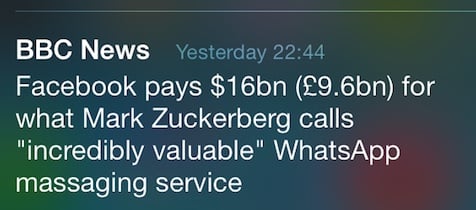This article is more than 1 year old
Facebook pays $19bn for WhatsApp. Yep. $45 for YOUR phone book
And they're not the biggest mugs. We are
+Analysis Putting a man on the Moon cost less than what Facebook paid for WhatsApp, a generic chat app. So why is Facebook paying $45 per user to gain functionality it already has?
The silly numbers look even sillier when you consider Facebook's own Messenger only lags narrowly behind WhatsApp in terms of usage. Facebook Messenger maintains a lead in the USA, despite WhatsApp's growth.
The most likely explanation is that it's actually paying $42 for your phone book.
WhatsApp notoriously rifles through your address book, scoops up your phone numbers, and uploads them to its servers. This is something Facebook has wanted for some time since its own phone records are incomplete.
Although half of its daily users are mobile, many don't share their full contact network with Facebook, and of the desktop-only Facebook users, many don't share their telephone numbers.
In July last year Symantec found that Facebook had slurped users' telephone numbers from its Android Facebook app. Caught red-handed, the social network said it had deleted the phone numbers extracted by this method from its servers.
Last October, in what was beginning to look like a desperation move, Facebook changed its policy to allow it to extract its users' phone number. Facebook admitted last summer it leaked some 6 million phone numbers passed voluntarily to the social network to other Facebook users.
Rather ominously, WhatsApp has a wretched reputation for security. It's really just a quick and dirty chat clone which borrowed much from the existing clients, and, as it was developed, BlackBerry's BBM.
Until August 2012, all chats were transmitted in plain text. It then implemented a crude and widely criticised cryptographic layer – which was compromised. In a word, its security is "horrible".
When it was discovered the same key was used to encrypt all messages in a conversation, so the contents could be fairly easily decrypted, CEO Jan Koum brushed away reporters with the comment: "We have a company to run. Back to work."
Koum now becomes a Facebook director. It's not likely he'll ruffle feathers in the dress-down boardroom with a pernickity attitude to personal privacy. If you were cynical – and sometimes it's hard not to be – you could say he'll fit right in.
Now, it's possible to argue that Facebook has also bought what could be the "universal phone dialer" of the future, in an era where we do more than just "dial". Increasingly, OTT chat apps are doing text and voice; as I've argued for years, they're really social networks in their own right. In a notorious piece I wrote in 2010 I described BBM as the perfect UI for a communication device. It presented your social network in a carousel of people and messages that was easy to control, and very compelling to use. All other activity on the BlackBerry such as sharing music or photos spun out of BBM.
Why weren't all phones designed around such a human-centric UI? Well, fast forward to now and WhatsApp has 310 million daily users and is adding 1 million users a day, demonstrating the strongest growth of any OTT messaging app. But in a copycat world, there are many other "universal phone dialers" out there with millions of users. There's Viber, Line, and BBM itself - finally and belatedly released on iOS and Android. There's no secret sauce to WhatsApp, which in any case, has almost run out of BBM features to replicate.
So spunking away so much money simply for the UI or brand is a long shot. The most rational explanation brings us back to the value of the data WhatsApp has captured.
I began this piece with a comparison with Apollo. I'll end it with another one, and it's one I'm not hearing too much today. If Facebook values your phone book at $42, or £25.24 today, what do you think your lifelong medical record is worth? The health industry is a colossal business, much bigger than internet social networking, and pharmaceutical companies desperately need the data to reduce the risk on their own drug research planning. They have the means and willingness to pay for this data.
So surely the market value of a medical record, given the many other valuable uses it can be put to, must be in the thousands of pounds?
Actually, the UK government in its wisdom has recently placed a value on it, and it's rather less than that.
Keeping the £25 for your phone book in mind, now look at this (PDF) - the price list for acquiring the UK's medical records, via the HSCIC extraction scheme. The scheme was delayed this week, so a new round of misleading PR can be whipped up - but the fundamentals are unchanged. The most it will cost the recipient of 60 million health records ("containing personal confidential data") is just £11,865.
That's 0.020 of a penny. Each.
Facebook has received much criticism for making an "insane" valuation. Yet we've allowed politicians to swallow the "open data" ideology, which insists we must give away our data for nothing. Because data must be free.
The biggest idiot today isn't Facebook. It's us. ®
Bootnote
The BBC had a slightly different take on WhatsApp's core functionality this morning:

